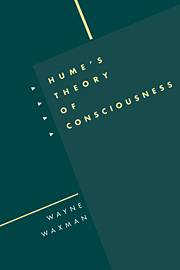Book contents
- Frontmatter
- Contents
- Preface
- Abbreviations
- Introduction: A false reason or none at all
- Part I The elements of Hume's philosophy
- 1 Impressions and ideas
- 2 Imagination and the vivacity of ideas
- 3 Words and measures
- Part II The cement of the universe
- Part III Vulgar fiction and philosophical fallacy
- Conclusion: The Cartesian nightmare come true
- Notes
- Bibliography
- Index
3 - Words and measures
Published online by Cambridge University Press: 11 September 2009
- Frontmatter
- Contents
- Preface
- Abbreviations
- Introduction: A false reason or none at all
- Part I The elements of Hume's philosophy
- 1 Impressions and ideas
- 2 Imagination and the vivacity of ideas
- 3 Words and measures
- Part II The cement of the universe
- Part III Vulgar fiction and philosophical fallacy
- Conclusion: The Cartesian nightmare come true
- Notes
- Bibliography
- Index
Summary
Abstract ideas: the legacy of Locke and Berkeley
Never did Hume express such a deep sense of obligation, or more warmly endorse the work of another, than at the outset of Treatise I/i/§7, “Of Abstract Ideas”:
A very material question has been started concerning abstract or general ideas, whether they be general or particular in the mind's conception of them. A great philosopher has disputed the receiv'd opinion in this particular, and has asserted, that all general ideas are nothing but particular ones, annexed to a certain term, which gives them a more extensive signification, and makes them recall upon occasion other individuals, which are similar to them. As I look upon this to be one of the greatest and most valuable discoveries that has been made of late years in the republic of letters, I shall here endeavour to confirm it by some arguments, which I hope will put it beyond all doubt and controversy.
The philosopher was George Berkeley. Since Hume's own treatment of the subject presupposes an acquaintance with Berkeley's, it will behoove us briefly to review and assess Berkeley's views on generality.
Although Berkeley directed his critique of abstract general ideas at all preceding philosophers (particularly materialists), his special target was Locke. This was not because Locke was more culpable in his eyes than others; he was perhaps closer to Locke and more deeply indebted to him than to any other thinker.
- Type
- Chapter
- Information
- Hume's Theory of Consciousness , pp. 85 - 128Publisher: Cambridge University PressPrint publication year: 1994

